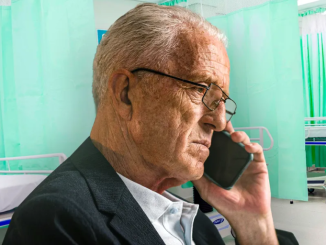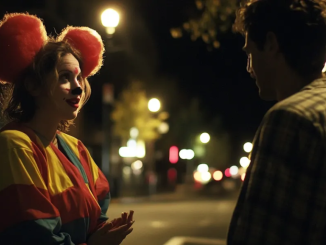The life story of Alex Lewis is like no other. This man refused to give up on his life no matter what it took, and today, he’s thriving with the help of his loving wife Lucy Townsend, and their son.
Alex and Lucy always knew they were meant for each other. When they married and welcomed their son Sam into their life, they felt like the happiest couple on Earth. But then in 2013, around the time Sam turned two, this family’s life took a different turn.

Both Alex and Sam caught the flu, or at least they believed so. However, as the boy got better in a short period of time, Alex wasn’t feeling fine even days after he experienced the flu-like symptoms.
“Because we owned and lived in a pub and came into contact with lots of different people, I assumed it was a seasonal cold and thought it started off as man flu,” Alex told Metro.
Instead of improving, his condition worsened and he became feverish and noticed blood in his urine.
As he could feel something was very wrong, he went to the hospital where doctors told him he contracted a streptococcal infection (type A). Unfortunately, at that point, the infection penetrated deep into the tissue and the organs and caused sepsis. Alex had contracted shock syndrome, septicemia, and necrotizing fascitis – and his body was attacking itself from the inside out.
“I called an ambulance, and within eight minutes, they were there. At the hospital, we went straight into resuscitation, and I was told to say goodbye. His kidneys were shutting down, and they were going to put him on life support,” his wife Lucy told The Guardian.
Doctors’ prognoses were dull. They told the family there was just a three percent chance that Alex would survive as his face and body turned black.
“They were going to turn my life support off, but they wanted to give me one more night to see if I improved, and they wanted to give my family a chance to say goodbye,” Alex told Metro.

“I cannot imagine what Lucy and my mum were going through.
“Having spoken to them since it happened, I think they were more in shock as they couldn’t believe something so incredibly invasive was happening so quickly,” he added.
“I don’t remember being in excruciating pain at this point, but my family remembers seeing me in absolute agony.”
It was determined that a flesh-eating bacteria was poisoning his body so doctors had to amputate his left arm up to the elbow. Sadly, as months passed by, Alex lost all of his limbs, and doctors were also forced to cut parts of his face in order to save his life.
“I can remember seeing my legs in hospital and how they were getting blacker and blacker,” Alex told The Guardian. “The blackness was creeping up towards my waist. I don’t remember seeing my left arm in that condition, but I can remember my legs vividly.”
As Alex lost his lips, plastic surgeon Alexandra Crick took skin from his shoulder in an attempt to fix his mouth.
“It would take me about an hour to eat a sandwich at night, and that was with the help of the nurse,” he told the Daily Mail.
“The last available skin for surgery was on my shoulder,” he explained. “So they replaced the temporary flap with that. All my other skin had to be used for grafts or was scarred.”
“Having my bottom and top lip done at the same time like this was a world first. It’s one piece of skin, and it was like if you imagine placing a bag in your mouth and then sewing around the edges. After the original operation, I had to have them every three or four months.”

Looking at his father, and how different he was, Sam was afraid to approach closer to him, but Lucy found a way to explain to him why his dad looked like that, which wasn’t easy as Sam was just two years old at the time.
After spending months at the hospital Alex could finally go home. The good thing was that doctors managed to save the elbow of his right arm which allowed him to have a prosthetic and be able to use his arm. Eventually, he could speak again as his lip surgery was a huge success.
“That one elbow is his whole independence,” Lucy said.
“I had to relearn everything,” Alex added. “From learning to eat, drink, put my clothes on, to learn to use a prosthesis, and to self propel a manual wheelchair.”
Today, Alex is involved in a number of tech projects which help ease the lives of disabled people. Among the rest, he has tested solar-powered, battery-assisted four-wheeled handles which have been designed by masters students at Southampton University.
Despite his condition, he’s living a quality life and is doing a lot of things, such as kayaking and climbing. In 2019, he climbed one of Africa’s tallest mountains using a specially adapted buggy.
“Since becoming an amputee, I’ve been fortunate enough to try out a number of training methods to keep my fitness up, working with physios and visiting the Help for Heroes training facilities,” he shared with Sports Management.
“I’ve had first-rate guidance, but nothing has been as effective as EMS training, especially in such a short space of time.
“It’s amazing how the machine helps me to engage muscles I haven’t felt since I lost my arms and legs,” he added.
“I feel stronger in training, daily life tasks are easier, and I’ve gained greater confidence that I can take on these challenges.”
His Wild Wheelchairs Project, besides helping improve the lives of disabled people, raises money to finance the construction and operation of a wheelchair manufacturing facility in Ethiopia.
Alex is also a motivational speaker who is happy with his life.
“I’ve lived more of a life in the past four years than I did in the previous 33, and it’s made me realize how much I love Lucy and Sam,” he told Metro.
“There was so much I regretted not doing when I had arms and legs, but I am not letting that happen again. I would not change anything, not in a heartbeat.”
Sam also learned to love his dad for who he is and is proud of him.
We truly admire this brave man’s resilience. His story is proof that no matter the curveballs life throws at us, we should always do our best to end up winners.
Lynda Wiesmeier: Cause of death, Playboy career, movies

Actress Lynda Wiesmeier gained notoriety for her roles in a few well-known movies.
However, one particular photo of her has drawn notice recently since it seems to offer a window into a bygone period.
Lynda Ann Wiesmeier, a blonde bombshell whose voluptuous form adorned the pages of Playboy Magazine, was born in Washington, D.C., in 1963.Her father was a doctor in the US Air Force, and Bitburg, Germany, was the starting point of her adventure. The family relocated frequently prior to Lynda’s eventual arrival in sunny Los Angeles. She also lived for a while in Bound Brook, New Jersey, where she established herself as a frequent Jersey coast sun worshipper.
Lynda enjoyed working and being active, juggling three professions: acting, modeling, and office clerking in a medical facility.
Playboy was drawn to her attractiveness in 1982, and they featured her as the centerfold of their July edition. Following her Playmate status, Lynda’s career in show business went into overdrive as she starred in movies that highlighted her gorgeous natural body. She starred in films like R.S.V.P. (1984), Teen Wolf (1984), Malibu Express (1984), and Real Genius (1985).
Last motion picture
However, her last movie may have been the one that made people take notice of Lynda Wiesmeier. She was chosen to play Dianne in the zombie horror film Evil Town in 1987.
The film featured the renowned Dean Jagger in the lead role of an insane scientist searching for perpetual youth. His approach? making a medication synthetically from human pituitary fluid, naturally. Things got worse as he was extracting the fluid; the poor donors’ brainless zombies were the product of the process.
In an intriguing turn of events, Keith Hefner, the younger brother of Playboy founder Hugh Hefner, was also featured in Evil Town. With Lynda and Keith involved, the movie had a strong Playboy vibe.
Though the movie was scheduled to open in theaters on June 3, 1987, there was so much anticipation that several theaters opened their screens a day early, on June 2. Nevertheless, Evil Town fell short of expectations despite the hype.
It was derided by critics who labeled it a “silly horror film.” Cavett Binion of All Movie Guide noted that the picture was a mash-up of footage from previous movies, including a 1970s unfinished effort, and that former Playboy Playmate Lynda Wiesmeier “spiced it up with some gratuitous nudity.” Hurt!
Fortunately, Lynda Wiesmeier was destined for a little return. In the years after its debut, a specific scene from Evil Town has become extremely popular for unknown reasons.
It’s not, however, for the reasons that one might think.
Scott Hunter, an almost unknown actor, appears on screen with Lynda in this unforgettable scene.
This appears to be your typical 1980s photo at first sight. A young guy and lady are posing in front of a Dodge automobile while wearing iconic ’80s clothing. But if you examine more closely, you might find something surprising!
Lynda is wearing high-waisted white shorts with a bright red blouse that is intricately knotted at the waist, while the man is wearing dark shorts and a gray hoodie with multicolored patterns all over it. Back then, short shorts were all the rage, and Scott wore his with one of those ubiquitous corduroy shirts.
Their vintage attire is a lovely return to the 1980s for many, since it screams ’80s fashion. And it’s just this that makes people swoon over this picture.
The 1980s saw a large, vivid, and dramatic fashion trend that we embraced, including glam rock, punk, and preppy designs.
We could experiment with hair, cosmetics, colors, and an abundance of plastic jewelry along with other wild accessories. And because to Lynda and Scott, we can sometimes be transported back in time to this amazing era with just a simple shot from a lesser-known movie.
departed the field
Following her departure from the film business, Lynda decided to start a family and married her first husband. She went on to have two amazing children, a son and a daughter.
The family made their home in Lafayette, Louisiana, where Lynda started working as a records manager at a legal firm, according to Joyce’s Take.
But then things changed, and in 2004 Lynda, ready to start again, packed her bags and moved to sunny California following her divorce. Lynda loved her relationship with her followers, even as she moved on. She became well-known at several fan events, sharing her experiences and signing autographs, such as WonderCon, Glamourcon, and The Hollywood Collectors Show.
Reason for demise
Sadly, Lynda’s adventure came to an end in December 2012, at the age of 49, after a valiant fight with a brain tumor.
Considering what she could have said about her time in movies like Evil Town, a nostalgic snapshot of a bygone period in movies, is bittersweet.
We can still honor Lynda’s legacy and the happiness she gave her admirers despite her passing. If you too miss the 1980s, please share this article!



Leave a Reply